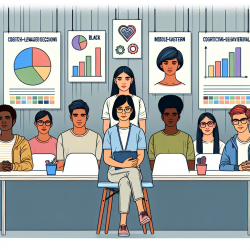Understanding the Impact of Gender Discrimination on Adolescents
As educators and therapists, understanding the complex interplay between gender discrimination and adolescent development is crucial. The study titled "Is My Femininity a Liability? Longitudinal Associations between Girls’ Experiences of Gender Discrimination, Internalizing Symptoms, and Gender Identity" provides valuable insights into how gender discrimination affects adolescent girls' mental health and gender identity.
The Phenomenological Variant of Ecological Systems Theory (PVEST)
This study utilizes the PVEST framework, which emphasizes how individuals make meaning of their experiences within ecological systems, particularly systems of power and oppression. This approach helps us understand the psychological dissonance that gender discrimination can cause, leading to internalizing symptoms and changes in gender identity.
Key Findings and Implications
The study found a reciprocal, longitudinal association between gender discrimination and internalizing symptoms, such as depression and anxiety. Discrimination was also linked to declines in gender identity, often mediated by these internalizing symptoms. This highlights the importance of addressing gender discrimination as a distinct risk factor during adolescence.
Practical Applications for Practitioners
For practitioners working with adolescents, these findings suggest several strategies:
- Promote Awareness: Educate students about gender discrimination and its impact on mental health and identity. Encourage open discussions to help them articulate their experiences.
- Develop Coping Strategies: Teach adaptive responses to sexism, such as seeking support from peers and engaging in positive self-affirmation practices.
- Foster Inclusive Environments: Create school and therapy environments that challenge patriarchal norms and promote gender equity.
- Engage in Continuous Learning: Stay informed about the latest research and interventions related to gender discrimination and adolescent development.
Encouraging Further Research
While this study provides valuable insights, it also highlights the need for further research. Practitioners are encouraged to explore how different social identities, such as race and ethnicity, intersect with gender discrimination. Additionally, understanding the role of school environments and broader social systems in perpetuating or mitigating discrimination can inform more effective interventions.
Conclusion
Gender discrimination is a pervasive issue that significantly impacts adolescent girls' mental health and gender identity. By understanding these dynamics and implementing strategies to support affected individuals, educators and therapists can play a pivotal role in fostering resilience and empowerment among young girls.
To read the original research paper, please follow this link: Is My Femininity a Liability? Longitudinal Associations between Girls’ Experiences of Gender Discrimination, Internalizing Symptoms, and Gender Identity.










